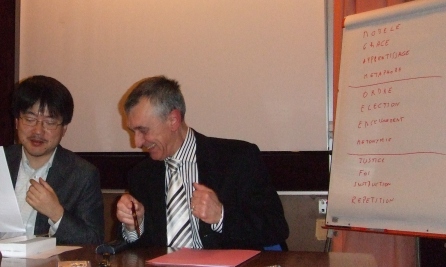【Report】the Forum 'Philosophy and Education' at Paris
On the 8th of January a forum took place at CiPH in Paris, organized by UTCP and CiPH under the title “Philosophy and Education: Teaching and Learning – about the pedagogy of the philosophy and the psychoanalysis”. This was the second meeting after November 2006 and was part of a project developed by UTCP.

The first presentation of the first section was Yuji Nishiyama’s “Hetero-didactics of the marionette – deconstruction and pedagogy in Jacques Derrida”. Nishiyama addressed the problem of the relationship between deconstruction and pedagogy in Derrida, who, on the one hand, was creating a crack in the methods of Philosophy till now by practicing deconstruction, and, on the other hand, participated actively in the education of philosophy making a lot of suggestions.
Next was Gohara’s presentation “L’enseignement par le dis-cours – la forme de l’enseignement selon Blanchot”. In this presentation an inversion was suggested, based on Blanchot’s 1963’s “Thought and its Form”, that one should rather than direct suggestions at the education of philosophy, but reconsider education as a fundamental form on which philosophical thought is grounded.

Next was Rada Ivencovic’s (University Saint Etienne) presentation “Faut-il enseigner pour apprendre de l’échec de son enseignement ? Le paradoxe de la relation maître-élève”. She was questioning equal whether autonomy of the subject is possible the relationship teacher-student, whether autonomy is not inevitably relative and thus making this relationship a political one, similar to the master-servant, man-woman.

The first presentation of the second section was “Psychoanalysis traces in the theory of historical knowledge: in Benjamin Passages (Passagen-Werk)” by Francisco Naishtat (Buenos Aires University). After rereading the motives of “dream”, “fetishism”, “phantasmagoria” in Benjamin’s Passagen-Werk at a collective level (not through Jung) but through Freud’s psychoanalysis, Naishtet argued that there is a nascent bud of an original Benjaminian historical consciousness in the accompanying motif of “awakening”.
Next was Kazuyuki Hara’s presentation “Love Lesson – Philosophy and Psychoanalysis”. Hara was questioning the conventional separating of philosophy and psychoanalysis as into theory and practice and introduced the term “leçon d’amour” as a common ground of both.
Last came Alain Juranville’s (Rennes I University) “Éloge du maître. Apprendre, enseigner, instruire”. He explained philosophy, psychoanalysis and pedagogy through three instances. First, the “ethical aspect of the teacher”, when the teacher erases his image, but acts as a model. Second, “the political aspect of the teacher”, who transmits knowledge, orders and must teach. And third, “the historical aspect of the teacher”, who has to educate men as a representative of justice.

The theme of “education of philosophy and psychoanalysis” represents concrete problems of “education in philosophy” and “education in psychoanalysis”. At the same time, this forum demonstrated how “philosophy and psychoanalysis as pedagogy” can be expanded almost infinitely.
(Kai Gohara, excerpted translation: Dennitza Gabrakova)






